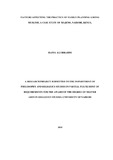| dc.description.abstract | The Muslim community continues to face various challenges with regard to family planning. This study assessed the extent to which Islamic culture influences the use of contraception among Kenyan Muslims, the level of knowledge on family planning among Kenyan Muslims, the extent to which Islamic faith affects family planning practices among Muslims and determined various challenges facing Muslims on the use of family planning. Social Cognitive Theory was used to examine the challenges of family planning on Muslims in Majengo Nairobi, Kenya. A sample of thirty couples and sixty youths were exposed to Questionnaires. Interview was applied to the Religious leaders and the Imam. The data collected was descriptively analysed using tables, quantitative data was entered and analysed using Statistical Package for social sciences (SPSS) software programme. Islamic culture influences the use of family planning and male involvement is very crucial in the practice of Family Planning among the Muslims. Majority of the respondents opined that the use of contraception. It was evident from the findings that a moderate number of Muslims in Majengo lacked basic concept on contraception. It was further discovered that some residents did not know what method was appropriate. A few did not know where to get contraceptive services. The findings established that most Muslims in Majengo used the family planning natural method. Majority of them never used modern contraceptive methods such as Vasectomy, Female Condom, Pills, implants and IUDs. Due to the poverty level in the area many Muslims could not acquire certain family planning methods because the government had failed to provide such methods in its public health centres. Muslims in Majengo are no different from the rest of the world. They aspire to reach their developmental goals by improving the health of their women and children. Islam should not be a barrier to this endeavour. The Kenyan government, Islamic religious leaders and Non-governmental Organisations should support and provide contraceptive methods to the residents of Majengo. Such efforts could go a long way in helping to prevent unplanned pregnancies and maintain an optimum family size. | en_US |

